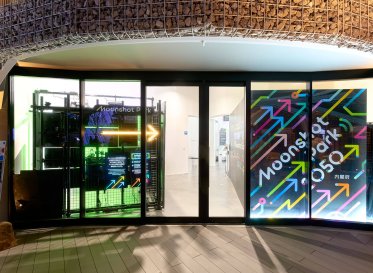
Fostering a diverse workforce
Unsung heroes of RIKEN CSRS
Communication Initiative to Promote Diversity and Inclusion
“Unsung Heroes in RIKEN CSRS” is a communication project through collaboration between RIKEN Center for Sustainable Resource Science (CSRS) and Loftwork, started in FY2022 with the aim of promoting diversity and inclusion (D&I).
In this initiative, CSRS would like to introduce a variety of RIKEN CSRS staff members with different positions – not only researchers but also assistants, technical staff, etc. You can discover their daily activities from these videos.

In March 2024, CSRS’s “Unsung Heroes of RIKEN won the RIKEN Diversity Initiative Award Grand Prize. To promote D&I activities, RIKEN has recognized distinctive activities across the organization and given RIKEN Diversity Initiative Awards annually.

From left: Yoko Tsuchiya (Research Administrative Support Staff; In charge of planning & production), Laurean Ilies (Team Leader, Interviewee), Kazuki Saito (Director of RIKEN CSRS), Mayuko Sato (Technical Scientist, Interviewee), Keiko Sakakibara (Research Administrator; In charge of planning & production)
“Unsung heroes in RIKEN CSRS” were highly recognized because it clearly shows how research relies on the staff members except for researchers by shining a light on the support staff often overlooked from outside the organization.
Focusing on a diverse workforce in the organization in addition to women* contributed to winning the award. Additionally, it was noted that the very attractive presentation of the staff’s job responsibilities, their personalities and the lively way they work, as well as the well-crafted Web page, led to this award.
*We use ‘woman/women’ instead of ‘female’. In 2022, the Cambridge Dictionary updated the definition of the word to include transgender people.
In this article, together with the CSRS staff, we reflect on our progress and contributions to the overall D&I promotion across the organization.
Author: Chiaki Seito
Editor: Yutaro Gokan (Loftwork.com Editorial Department)
Why Did We Focus on Staff in Different Positions?
Japan has been known for its very low proportion of women in STEM compared to other developed countries. RIKEN has been tackling this issue by ensuring inclusive hiring processes and leadership promotion. RIKEN also provides individual counseling to women junior/senior high school and university students hoping to pursue a career in STEM fields.
From these organization-wide activities, RIKEN CSRS took a step further. The “Unsung Heroes in RIKEN CSRS” project was born from our search for communication to promote D&I by broadening our perspective beyond gender imbalance throughout the organization.
“Unsung Heroes” includes a diverse workforce. We focus on different topics, such as gender imbalance per job category, nationality, culture, and career development. Additionally, the project tackles a lack of information on the role of non-researchers.

We aim to introduce RIKEN staff in internal and external communications, as well as outward-facing endeavors such as recruitment. The project is designed to give a friendly impression about the people at RIKEN and the work they do.
Positive Insights in The Process
“Unsung Heroes in RIKEN CSRS” is video series that so far consists of six 10-minute videos featuring staff members. Each video focuses on a single person, their positive reputation, and the positive impact they have on their colleagues.

The director, Yuta Kuronuma of Loftwork, was inspired by nature documentaries when he first started the project.
“The motif I had in mind for the structure of the series was a famous book “Wild Animals I Have Known [about naturalist Ernest Seton Thompson],” Kuronuma said.
The story is told not in the words of the protagonist, but in the words of an outside observer, such as a colleague or a team member. They would describe an event where the main character had a positive impact on them.
Kuronuma continued, “I thought it might be possible to make the video about the ‘ecology’ of individuals in a work environment. In doing so, I wanted to give viewers an experience that was more like witnessing the daily life of a person they’ve heard rumors about, rather than learning about a stranger. I wanted the viewer to feel more interested and familiar with the characters.”

There was a trick in the production process. The featured person was filmed without knowing about their colleagues’ testimonies. Their interviews were revealed for the first time during the previews. It was hoped that this would give them a chance to realize what their coworkers thought of them, and to reaffirm their bond with the team. Their real-time reactions to those interviews are shown at the end of each video.


The intention was to provide the people outside the RIKEN CSRS an opportunity to learn about the organization’s work visually. The production process allowed internal participants to visualize the contributions of each other’s day-to-day activities and celebrate the achievements.
Yoko Tsuchiya of RIKEN CSRS (Office of the Center Director) reflected on this project as follows.
For the staff members who participated, I hope it was a time to take a closer look at each other in the midst of their busy daily routines. It was also a good opportunity for other CSRS members to learn about the true nature of other laboratories. I hope that this project will continue to have positive impacts: value and respect each and every member of our staff in their future work,Tsuchiya said.

Spotlight on Administrative Assistants
How has “Unsung Heroes in RIKEN CSRS” been received within CSRS? We also asked the members of the RIKEN CSRS Diversity Promotion Working Group what they thought about it.

This working group is composed of volunteer staff members. In addition to sharing and discussing issues of interest, the group has occasionally gathered various opinion and proposed their ideas to the related divisions.
For example, when it was pointed out that it is quite difficult to tell whether the menu at the cafeteria is suitable for certain dietary restrictions, the working group advocated for these voices and the cafeteria now displays easy-to-understand labels for ingredients.
Another example is the creation of a prayer room for Muslims.

One member of the working group reflected the video project: “‘Unsung Heroes in RIKEN CSRS’ was very useful for communication within CSRS. When I bumped into Mayuko Sato, who was featured in one of the movies, in the cafeteria, I approached to her asking, ‘You must be the person in the video, aren’t you?’ and we had lunch together. I also think it shows role models. I learned a lot from knowing that there are people like Dr. Jong-Myong Kim, who has become an entrepreneur.
Others commented that they particularly liked to see non-researchers featured. In the research world, to be an author on a paper, you have to be able to “explain” the research. Therefore, laboratory assistants who provide administrative support to a team will not see their names on research papers. The same applies to staff who are solely responsible for maintaining the research environment, such as taking care of plants and mice for research use. Without such support work, researchers would not be able to obtain experimental data — but it is difficult for them to be in the spotlight.

Links Between D&I And Complementing/ Giving Feedback to Each Other
Another interesting comment from a member of the working group was that “Japanese people tend to find it difficult to give feedback unless it is asked for it.” Therefore, the fact that the “Unsung Heroes in RIKEN CSRS” videos show colleagues giving each other feedback and complementing each other was positively received.
Even if we cannot change the rules about giving credits on scientific papers, “members can talk to each other and simply say ‘thank you’”, another said. “I think that attitude of ‘awareness’ is also important in promoting diversity.”

The production team hoped that the planning and the making process would create momentum to promote D&I among the participants, but how did it work? We also asked Tomomi Minami, an assistant who appeared in the video of Laurean Ilies, leader of the Advanced Organic Synthesis Research Team.
It was really nice to reconnect with the team through my participation. I wasn’t particularly aware of D&I promotion during my participation, but that’s maybe because Laurean’s team has always been a very communicative and psychologically safe team to begin with, Minami said.
On the other hand, for those who have issues communicating gratitude to their coworkers, the process of participating in the projects could be a trigger for revitalizing communication and promoting D&I. Minami’s words also showed the importance of creating an environment where everyone feels safe to speak up — in other words, an environment where “psychological safety” is guaranteed.

Going Forward, What should We Target with D&I Promotion?
Illustrator Chihiro Kinoshita, who worked on the project, was a staff member of a marine biology research institute until 2023. She shared her thoughts on the project.

(*Photograph taken during her turtle research, with special permission.)
I thought it was a very new and challenging project. Although it’s quite common to simply spotlight on research or the researchers, I have almost never seen a project that spotlights people who support the research. I feel that research is something that is only made possible by many people working together, so I was happy to see the spotlight on those involved in research, as if it were my own achievement. I hope to see similar initiatives at other research institutions in the future. I feel that the ‘Unsung Heroes in RIKEN CSRS’ has become a role model for this sort of project.
As expected, “Unsung Heroes in RIKEN CSRS” promoted internal communication. Furthermore, it also succeeded in refreshing the public image of the science world and research work. Kinoshita also emphasizes the importance of promoting D&I in organizations.
“Currently, in the research world, ‘diversity’ tends to refer to gender and nationality, but I think that in the future we need to create opportunities for people with physical and other disabilities to thrive,” she said. “I think that by taking a broader definition of ‘diversity,’ we can create an organization where many people can work flexibly.”
In recent years, the term “intersectionality” has gained attention in the field of D&I as a framework for understanding the complex co-existence of various attributes within individuals, such as gender, sexual orientation, race, class, nationality, or disability.
Kinoshita’s words are certainly relevant to the idea of intersectionality. In the future, organizations will need to make efforts to understand and include more complex intersectional minorities into their policies. The content and the whole process of “Unsung Heroes of RIKEN CSRS” project were full of lessons for further promoting D&I.
Project Summary
- Client: RIKEN Center for Sustainable Resource Science (CSRS)
- Project period: November 2022 – March 2023, November 2023 – March 2024
- Loftwork Inc.
- Producer:Takahiro Nakamaruo
- Project Manager/Video Director:Yuta Kuronuma
- Web Director : Asako Muraoka
- Technical Director : Masumi Murata
- Production Partners
- Web Design : nicotto lab.
- Logo design: ARROMATA
- Illustration: Chihiro Kinoshita
- Cinematography:Kengo Totani









